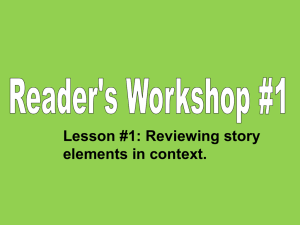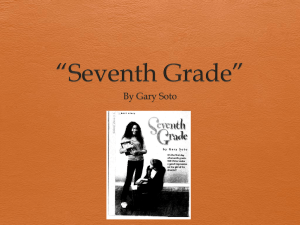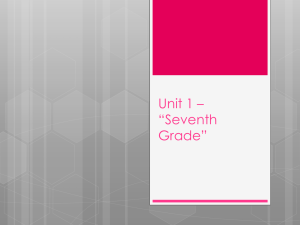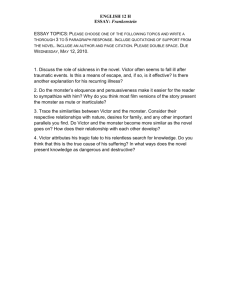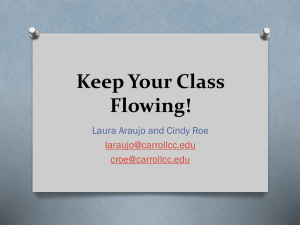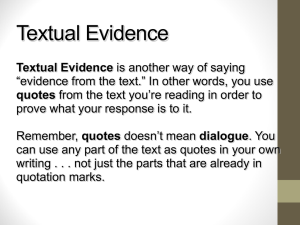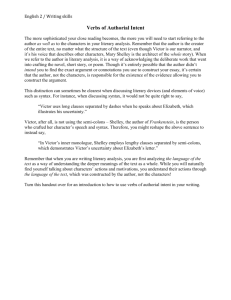2014 PLEA Paragraph Explained
advertisement
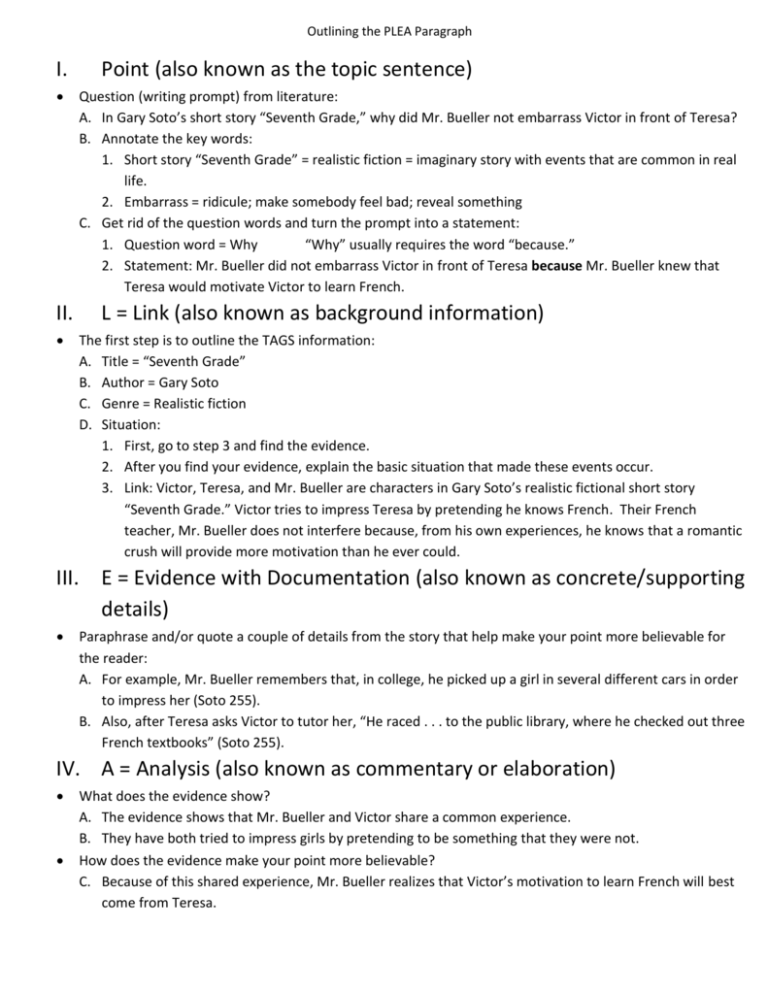
Outlining the PLEA Paragraph I. II. Point (also known as the topic sentence) Question (writing prompt) from literature: A. In Gary Soto’s short story “Seventh Grade,” why did Mr. Bueller not embarrass Victor in front of Teresa? B. Annotate the key words: 1. Short story “Seventh Grade” = realistic fiction = imaginary story with events that are common in real life. 2. Embarrass = ridicule; make somebody feel bad; reveal something C. Get rid of the question words and turn the prompt into a statement: 1. Question word = Why “Why” usually requires the word “because.” 2. Statement: Mr. Bueller did not embarrass Victor in front of Teresa because Mr. Bueller knew that Teresa would motivate Victor to learn French. L = Link (also known as background information) The first step is to outline the TAGS information: A. Title = “Seventh Grade” B. Author = Gary Soto C. Genre = Realistic fiction D. Situation: 1. First, go to step 3 and find the evidence. 2. After you find your evidence, explain the basic situation that made these events occur. 3. Link: Victor, Teresa, and Mr. Bueller are characters in Gary Soto’s realistic fictional short story “Seventh Grade.” Victor tries to impress Teresa by pretending he knows French. Their French teacher, Mr. Bueller does not interfere because, from his own experiences, he knows that a romantic crush will provide more motivation than he ever could. III. E = Evidence with Documentation (also known as concrete/supporting details) Paraphrase and/or quote a couple of details from the story that help make your point more believable for the reader: A. For example, Mr. Bueller remembers that, in college, he picked up a girl in several different cars in order to impress her (Soto 255). B. Also, after Teresa asks Victor to tutor her, “He raced . . . to the public library, where he checked out three French textbooks” (Soto 255). IV. A = Analysis (also known as commentary or elaboration) What does the evidence show? A. The evidence shows that Mr. Bueller and Victor share a common experience. B. They have both tried to impress girls by pretending to be something that they were not. How does the evidence make your point more believable? C. Because of this shared experience, Mr. Bueller realizes that Victor’s motivation to learn French will best come from Teresa. PLEA Paragraph Mr. Bueller did not embarrass Victor in front of Teresa because Mr. Bueller knew that Teresa would motivate Victor to learn French. Victor, Teresa, and Mr. Bueller are characters in Gary Soto’s realistic fictional short story “Seventh Grade.” Victor tries to impress Teresa by pretending he knows French. Their French teacher, Mr. Bueller, does not interfere because, from his own experiences, he knows that a romantic crush will provide more motivation than he ever could. For example, Mr. Bueller remembers that, in college, he picked up a girl in several different cars in order to impress her (Soto 255). Also, after Teresa asks Victor to tutor her, “He raced . . . to the public library, where he checked out three French textbooks” (255). The evidence shows that Mr. Bueller and Victor share a common experience. They have both tried to impress girls by pretending to be something that they were not. Because of this shared experience, Mr. Bueller realizes that Victor’s motivation to learn French will best come from Teresa. Outlining the PLEA Paragraph I. Point (also known as the topic sentence) Question (writing prompt) from real life: A. How do best friends justify their actions whenever they have to compete against each other? B. Annotate the key words: 1. Justify = explain; defend; rationalize; excuse 2. Compete = contest; contend; strive C. Get rid of the question words and turn the prompt into a statement: 1. Question words = How and do “How” usually requires the word “by.” 2. Statement: Best friends justify their actions whenever they have to compete against each other by believing that their friendship is more important than the competition. II. L = Link (also known as background information) A. No TAG information needed—just the situation B. Situation: 1. First, go to step 3 and find the evidence. 2. This issue is especially relevant in a world that has become highly competitive. 3. Today, people compete in everything from sports, to board games, to even the appearance of their front lawns, so best friends are bound to find themselves in this predicament at one point or another. 4. During my senior year in high school, my best friend and I had to race each other at the state meet, so in order to preserve our friendship, we came to the following agreement. III. E = Evidence Summarize a couple of real-life examples that help make your point more believable: A. For instance, during my senior year in high school, my best friend and I had to race each other at the state meet, so in order to preserve our friendship, we came to the following agreement. B. First, we would both hold nothing back. C. Second, no matter what the outcome, we would meet up after the race and jog our normal cool down. IV. A = Analysis (also known as commentary or elaboration) What does the evidence show? A. This example shows that best friends do believe that competition is important, but friendships can survive the test. How does the evidence make the point more believable B. In reality, because I won the race and the state title, our friendship was never as close as it was before the race. However, this example demonstrates that friends like to believe their competitive actions will not affect their friendships. PLEA Paragraph Best friends justify their actions whenever they have to compete against each other by believing that their friendship is more important than the competition. This issue is especially relevant in a world that has become highly competitive. Today, people compete in everything from sports, to board games, to even the appearance of their front lawns, so best friends are bound to find themselves in this predicament at one point or another. For instance, during my senior year in high school, my best friend and I had to race each other at the state meet, so in order to preserve our friendship, we came to the following agreement. First, we would both hold nothing back. Second, no matter what the outcome, we would meet up after the race and jog our normal cool down. This example shows that best friends do believe that competition is important, but friendships can survive the test. In reality, because I won the race and the state title, our friendship was never as close as it was before the race. However, this example demonstrates that friends like to believe their competitive actions will not affect their friendships.
